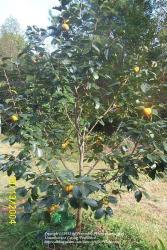Japanese persimmons fall into one of two categories: non-astringent and astringent. Both are hardy to zone 7. The non-astringent varieties do not make your mouth pucker and can be eaten much like an apple while they are still firm. The astringent varieties must be jelly soft ripe before they are edible. The astringent varieties are usually the ones used in baking although you can also use the non-astringent varieties if you let the fruit get jelly soft. The astringent ones are generally sweeter and more flavorful., but that's a matter of taste.
Japanese persimmons, unlike most other fruit, bloom after the leaves have emerged. So fruit loss due to a late freeze is usually not a problem unless your freezes extend into May. However, the leaves can be damaged by temperatures lower than 26ºF.
They are grafted onto one of three rootstock: D. lotus, D. Kaki and D. virginiana. The D. kaki rootstock, the preferred rootstock, is a Japanese persimmon seedling which develops long taproots and fiberous lateral roots, but trees grafted onto this rootstock is impossible to find. At least, I haven't been able to find the true Fuyu grafted onto this rootstock.
The grafted persimmons sold here in the US are grafted to either D. lotus or onto the American persimmon, D. virginiana. D. lotus is the most common of the two rootstock, but it is not compatible with the Fuyu persimmon. If you get a "Fuyu" grafted onto D. lotus, it is usually the Jiro variety and not the true Fuyu. The D. virginiana rootstock suckers badly and fruit production is inconsistent, but it is more cold hardy. If you order from an eastern nursery, you are more likely to get trees grafted on to D. virginana. If you want trees grafted onto D. lotus, buy from a west coast nursery. Be mindful that most bareroot tree nurseries ship only during winter and early spring.
I've ordered my persimmon trees from either Raintree nursery in Washington or from Bay Laurel Nursery in California. Of the two, I gravitate toward Bay Laurel Nursery because they ship in January, the second best planting month in central Texas. Raintree won't ship until March. Both nurseries provide good sturdy and healthy trees.
You may find these links very useful:
http://www.crfg.org/pubs/ff/pe...
http://www.plantanswers.com/ga...
I prefer to eat my persimmons while they are still firm so most of the trees I have bought are the non-astringent variety, but I did buy two astringent varieties, Hachiya and Saijo, last year.
